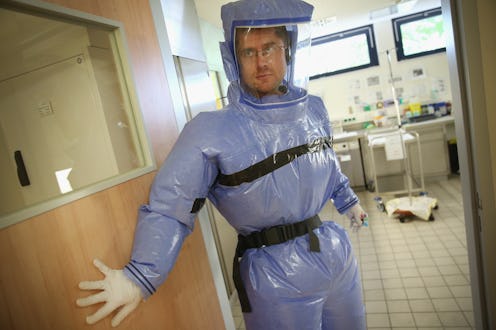News
A Timeline Of Ebola's Spread Out Of West Africa
Once restricted to West Africa, the 2014 Ebola outbreak has officially made it to the United States and a handful of European countries. Still, the Ebola outbreak is not a full-fledged global crisis — not yet, at least, thanks to the tireless work of international aid organizations and the World Health Organization (WHO). The number of Ebola cases outside of Africa are minuscule, and it's important to keep perspective on that. But just how many Ebola victims treated outside of West Africa are there?
Of the more than 4,400 people who've died from Ebola since the outbreak began in Dec. 2013, according to the WHO's estimates, a staggering majority have been located within three West African nations — Guinea, Liberia, and Sierra Leone. Those are the places and the people who're really facing the full horror of this situation, and that's not to be overlooked when assessing the situation beyond Africa's continental borders.
According to the New York Times, there have been at least 17 instances of Ebola patients being treated outside of West Africa. Most caught the virus there, and were flown home. Four Ebola cases were diagnosed or contracted outside of West Africa — three American cases, all in Dallas, and a nurse in Spain. Here's a timeline explaining exactly how the virus made it out of West Africa.
Patrick Sawyer, July 20
The first real scare regarding border-crossings by Ebola-stricken individuals came on July 20, when a Liberian-American man named Patrick Sawyer — Liberia being the country hit hardest by the outbreak — traveled to Lagos, Nigeria via plane, before collapsing and dying of the highly lethal virus five days later. While Nigeria is still fairly proximate to Liberia, along the West African coast, it highlighted the terrifying possibility of a seemingly healthy person hopping a flight and falling ill at their destination, speeding Ebola's spread.
William Pooley, Aug. 24
Infected while volunteering as a nurse in Sierra Leone, Pooley was the first Briton to be diagnosed with Ebola, and brought the illness back with him when he was flown home to receive medical treatment on Aug. 24. Luckily, there were no known infections as a result of Pooley's transit, and with the help of medical professionals, he survived the harrowing ordeal. And Pooley hasn't stopped working against Ebola since, either — he's been donating his survivor's blood to try to save other victims.
Thomas Eric Duncan, Sept. 30
By now, Duncan is no stranger to American news observers — a Liberian national who flew into Texas in September, Duncan began feeling sick days after his arrival in the United States. He visited Texas Health Presbyterian Hospital in Dallas, Texas, only to be turned away. When he came back days later with aggressive symptoms of Ebola, it was too late. Duncan was diagnosed on Sept. 30, and isolated until his death on Oct. 6.
Since his death, members of Duncan's family have condemned the hospital for failing to identify his illness and treat him the first time he showed up. Duncan's nephew wrote a particularly scathing op-ed in the Dallas Morning News on the subject, alleging both class and racial biases played a role.
Teresa Romero Ramos, Oct. 6
Ramos, a nurse based in Madrid, Spain, was infected with Ebola and was first person to contract the virus outside of Africa. To that point, Ebola cases abroad had all originated directly from West Africa, but that changed when Ramos treated an elderly priest, Manuel García Viejo, who died of Ebola days later. Before too long, Ramos herself was diagnosed and put into isolation, in spite of confusion about how it all happened — Ramos insists she followed all health protocols when dealing with Viejo, and she doesn't know how she caught the virus.
Ramos was given the experimental Ebola drug ZMapp, and recent reports suggest her condition may be slightly improving.
Nina Pham, Oct. 11
A nurse at Texas Health Presbyterian Hospital, Pham was one of a team of 70 nurses who helped tend to Duncan while he was isolated and dying. It's not yet known how she contracted the virus — CDC director Tom Freiden, under considerable scrutiny over the situation, blamed the infection on a "breach in protocol." Pham is currently isolated, and has received a blood transfusion from Ebola-survivor Dr. Kent Brantly.
Amber Vinson, Oct. 14
Another of Duncan's nurses at Texas Health Presbyterian Hospital, Vinson was diagnosed with Ebola Tuesday night. While the details of how she was infected are yet unclear, the story has generated a lot of attention, because she took a commercial flight while reportedly already suffering a temperature, an action which the CDC has said should not have been allowed. She's currently receiving care in Dallas, while awaiting a transfer to Emory University hospital in Georgia.
Images: Getty Images (2 ); The Guardian
